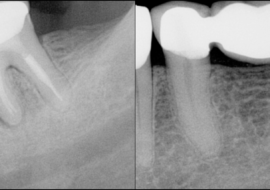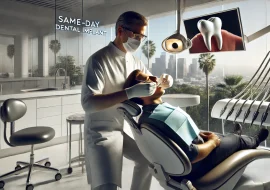Diet and Oral Health
Studies looking at possible links between oral health in general, periodontal health in particular, and systemic health impacting the major organs such as the heart and the brain have been accumulating for years. The outcomes can often be confusing for laypeople because of scientific language that is complex and may seem self-contradictory. This is partly because the science is still new, and the body is a complex system where everything may impact anything else. It’s often unclear whether oral health impacts overall bodily health, or if the health of the body and its major organs improves oral health or, perhaps more likely, they impact each other in a sort of feedback loop.
So, the most we can really say for sure is that eating a nutritious diet and regular oral hygiene is the best path we have for a lifelong healthy smile and health worth smiling about. Even so, researchers are trying to see if they can be just a little bit more specific in terms of which foods to watch out for if we’re concerned about diseases of the gums.
Oxidation and Inflammation
A new September 2023 article published in BMC Nutrition documents a study exploring the possible connection between periodontal illness and diets higher in nutrients that are considered pro-inflammatory as opposed to nutrients with antioxidants that tend to lower inflammation.
The study followed two groups of people who were keeping detailed track of everything they ate. One group had periodontal illnesses and the other, the control group, did not. The study was admittedly far from conclusive, but it was successful in finding a difference in the diet of the two groups. It specifically noted:
“There was a significant difference between the mean intake of micronutrients and food groups, including [pro-inflammatory] saturated fatty acids (SFAs), iron, magnesium, manganese, vitamin C, crude fiber, selenium, chromium, whole fiber, caffeine, dairy, and meat, between patients with periodontitis and the control group.”
We should note three things.
- None of the substances mentioned as pro-inflammatory are inherently unhealthy in the correct amounts. Many – including vitamin C, fiber, and iron – are essential. Also, many of them may act as both pro-oxidants and antioxidants depending on circumstances. (We said it could be confusing!)
- Correlation is not causation; the study is only pointing to a possible connection
- Regardless, inflammation appears to be among the most important culprits in a growing number of illnesses, from cardiovascular diseases to cancer, to Alzheimer’s, to chronic pain. Eating foods to minimize inflammation should be a no-lose proposition.
Eating to Reduce Inflammation
So, let's look at a food that is undoubtedly healthy when consumed whole: an orange. On the one hand, the ubiquitous fruit contains vitamin C, which is usually an antioxidant but which can also be pro-oxidant. Regardless, citric acid, as it is also known, is very literally something we can’t live without.
Oranges also contain fiber which we need for good digestion. Fiber can also contain antioxidants, but it can foster oxidation on its own.
The main reason humans like oranges so much, however, is that they contain simple sugars which are pro-inflammatories and arguably health public enemy #1. Fortunately, the orange also contains powerful anti-inflammatories called polyphenols which makes eating an orange likely to reduce inflammation overall. The benefits of an orange decrease greatly, however, if you only drink orange juice. The concentration of calories and the large amounts of sugar it contains make it only marginally less bad than a standard sugary soda. Generally speaking, foods are going to be healthier if they are less processed.
Caffeine is another case in point. There has been an ongoing debate about whether it’s a health hero, villain, or something in between. By itself, it might be pro-inflammatory or anti-inflammatory. In any case, if we obtain it from energy drinks or colas, we probably aren’t doing ourselves much good. While some energy drinks make nutritional claims, there are issues with calories and tooth-unfriendly acids, and any nutrients we get are likely to be marginal. However, if we get our caffeine via coffee or tea, we are also getting powerful anti-inflammatories. Of course, tea and coffee are frequent causes of staining in teeth and many people like to drink them with tooth-dissolving sugar and saturated fat-laden cream. Nothing’s perfect! Keep brushing and flossing.
Speaking of cream, low-fat dairy products are an excellent source of the calcium we need for healthy teeth, along with protein and other important nutrients, but even lower-fat products have their share of calorie-laden carbs. So, dairy foods are often good choices but only if consumed moderately and without too much oxidant saturated fats. Also, what you’ve heard about yogurt is true. It may have anti-inflammatory properties and may often support good digestion.
Eggs may be extremely healthy when not fried with a lot of fat. They are high in omega-3 fatty acids and vitamin D, an antioxidant that is also essential for metabolizing calcium to avoid tooth loss and osteoporosis. Eggs have their issues, however; they contain substances that may increase oxidation in certain people and most of us will still be told by our doctor to take vitamin D supplements as we age no matter how many eggs we eat. While the cholesterol in eggs was once a widely known concern, we know now that they do not increase “bad” LDL cholesterol levels in most people who eat them.
Meat is another type of food that may be healthy lean and in moderate amounts. There are also numerous concerns about how meat is prepared. Well-done grilled/charred meats may be carcinogenic and can significantly increase the risk of deadly pancreatic cancers if eaten regularly. Processed deli meats aren’t much better. However, it’s generally agreed that seafood is by far the most beneficial type of protein. High-fat fish like salmon and sardines are arguably healthier than leaner fish as they are rich in anti-inflammatory omega-3 fish oils. Alas, those oils that can make salmon such a healthy treat also mean more calories. (Again, nothing’s perfect!)
Speaking of calories, yes, it’s important to keep them from getting out of hand. And, yes, refined pasta, rice, baked goods, and other foods high in simple carbohydrates are both fattening and pro-inflammatory. We probably don’t have to tell you that sweet baked goods are, as Cookie Monster himself put it, “a sometime food.” At the same time, trendy zero-carb diets can be problematic, it’s best to get most of your carbohydrates from whole grains and legumes such as beans and nuts which are often rich in antioxidant nutrients.
We keep talking about calories because being overweight or obese also causes inflammation. New drugs and bariatric surgery notwithstanding, permanently defeating obesity is difficult and rare in adulthood, especially if we’re past college age. Though overweight people can do themselves a lot of good by keeping their weight under control and even a small weight loss can be beneficial, prevention is always best. If you’re a thin person, please try to stay that way.
What Kind of Overall Diet is Best for Reducing Inflammation?
If you’re looking for the best eating plan to reduce inflammation for your oral and overall health, it’s not always easy to say. Everyone is different and the best healthy dietary plan is always one you can stick to. Moreover, it’s hard to go wrong if you eat a wide variety of food in moderate quantities, including generous amounts of fresh vegetables and fruit.
All that being said, more and more doctors seem to be coming around to what we call the Mediterranean diet, which includes foods rich in antioxidants including healthy fats such as nuts, fish, chickpeas, and olive oil, as well as lots of whole grains and a wide palette of herbs and spices that make it possible to reduce salt while still tasting delicious. It's also got a lot of yogurt in it. If you love eating Middle Eastern or Greek cuisine, this may be the best path for you.
Of course, after you’ve eaten whatever it is you’re eating, you probably won’t be surprised when we say that you should floss and brush your teeth for at least two minutes twice daily. Using mouthwash regularly doesn’t hurt either. Also, visit the dentist twice a year.
You knew that was coming. We are talking mostly about oral health here, right?
Healthy Gums for a Healthy Life
Believe it or not, some 70 percent of the population is believed to have at least a mild case of gingivitis – and that includes some people with excellent oral hygiene habits. At the first signs of symptoms like persistent bad breath (halitosis), dry mouth, or any sign of bleeding gums, including a slightly pink toothbrush, please seek out the help of a skilled oral health professional.
If you’re looking for periodontal disease treatment on the west side of Los Angeles, gum specialist Dr. Peiman Soleymani of Beverly Hills Periodontic & Dental Implant Center is one of the nation’s most respected authorities and has dealt with many advanced cases of periodontitis. For people whose situation has progressed to the point where extractions and site preservation are necessary or who have lost one or more teeth due to trauma, he is also a leader in the field of oral implantology so he can handle the entire process and has been praised by his patients for his careful and gentle approach.
For more information, feel free to get in touch with us via the phone number on your screen or by filling out the form on our contact page.







Recent Comments